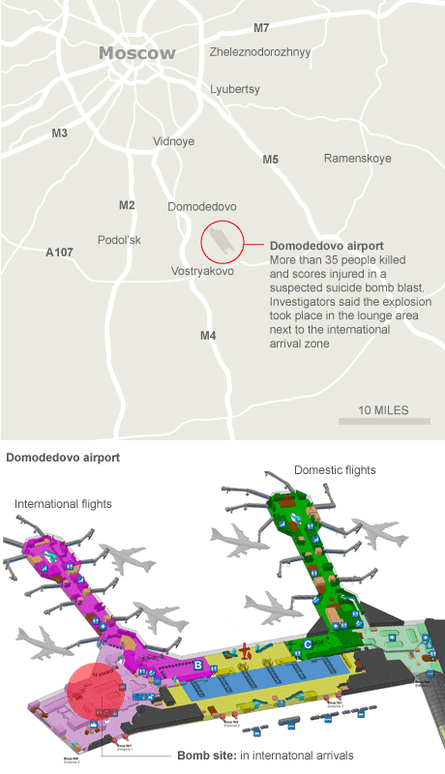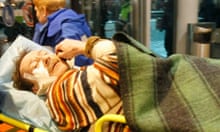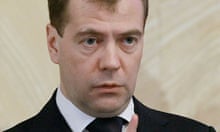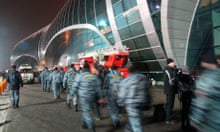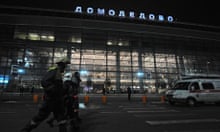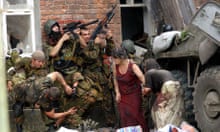At least 35 people were killed and 130 injured in a suspected suicide bombing today at Moscow's biggest airport, Domodedovo, Russian officials said.
A spokeswoman for the healthcare ministry said a further 20 people injured in the bombing were in a critical condition in hospital. Sources said three men were suspected of plotting the explosion, which had the power of 7kg of TNT.
The attack is the most deadly in Russia since last March when two female suicide bombers from Russia's Mulsim-majority Dagestan region set off explosives on the subway system, killing 40 people. It was Moscow's worst attack for six years.
Russian investigators said today's explosion took place in the lounge area next to the international departure zone and close to the Asia cafe. Another source said "dozens" had been injured.
A traveller identified as Viktor told the Russkaya Sluzhba Novostei radio station that he heard the bang from outside the airport, where he was waiting for a car. "There was an explosion, a bang. Then I saw a policeman covered in fragments of flesh and all bloody. He was shouting, 'I've survived! I've survived!'"
Mark Green, a British Airways passenger who had just arrived at the airport, told the BBC he heard the explosion as he was leaving the terminal.
"Literally, it shook you," he said. "As we were putting the bags in the car a lot of alarms ... were going off and people started flowing out of the terminal, some of whom were covered in blood. One gentleman had a pair of jeans on that was ripped and his thigh from his groin to his knee was covered in blood."
The airport is used by numerous international carriers including BA and BMI, which flies four times daily between London and Moscow. Domodedovo is connected to the centre of the capital by a high-speed train and is the airport of choice for Moscow's large expatriate population.
In a Twitter message, the Russian president, Dmitry Medvedev, vowed to track down and punish those responsible. "Security will be strengthened at large transport hubs," he wrote. "We mourn the victims of the terrorist attack at Domodedovo airport. The organisers will be tracked down and punished."
Witnesses said there was heavy smoke over the airport and the entry from the arrivals zone had been closed. "There is the smell of smoke at that section. No announcements have been made yet through loudspeakers," passengers reported via Twitter. Others Twitters users, citing emergency staff at the scene, said up to 70 people may have been killed.
Investigators said they believed the explosion was caused a suicide bomber. "The preliminary reports suggest that the explosive device was activated at the international arrivals section by a suicide bomber," one source said. Several international planes were diverted to Sheremetyevo airport, with Domodedovo temporarily closed to incoming planes.
Russia's security agencies received a warning ahead of today's blast of a possible attack on a Moscow airport, news agencies reported. "We received information that in one of Moscow's airports a terrorist attack could possibly take place," a source told RIA Novosti.
The source said police had been searching for three suspects. The suicide bomber appears to have entered the building unchallenged, taken the lift up to the second floor and then blown himself up. Two others monitored the explosion and then left, the official suggested.
Russian opposition bloggers demanded to know why security measures had not been enhanced at airports in response to the tipoff. Oleg Kozlovsky, an opposition activist, tweeted: "If the FSB [Russian's domestic anti-terrorism agency] knew about the warning a week ago, why didn't they check passengers arriving at airports?"
Another source told Interfax: "According to intelligence, three men may have been involved in organising the explosion, men who have been living in the region of the capital for some time. They have been put on the wanted list."
He said the three suspects were believed to be militants from Russia's North Caucasus. They allegedly had connections to a woman who blew herself up in Moscow on 31 December and another who was later arrested in Volgograd. "It can't be ruled out that one of the three blew himself up at Domodedovo," the source said.
A team of investigators began sifting through video footage from security cameras at Domodedovo and requested a list of mobile phone users in this area. CCTV cameras are installed both inside the airport and in the surrounding area.
Security has been stepped up across Moscow, with police put on high alert at all transport hubs.
The attack is likely to be blamed on Islamist radicals, and is another grim sign that terrorism has returned to the Russian capital. The Kremlin has repeatedly insisted the situation in Russia's North Caucasus has stabilised after two brutal federal wars against Chechen rebels in 1994-1996 and 1999-2005. The airport bombing and last year's metro attack on the metro suggest this claim is a fairytale.
Across its mountainous southern frontier the Russian state is fighting a group of determined and well-organised insurgents who want to establish a pan-Islamic caliphate. The republics of Ingushetia, Chechnya, and Dagestan – where the insurgents operate – are gripped by civil war, with daily attacks on police and local security forces.
The Kremlin has responded to this threat to its integrity with characteristic brutality. It has launched a series of special operations. Last year its special forces killed Said Buryatsky, a senior rebel and Russian-born Islamist convert, in a village in Ingushetia.
Another insurgent leader, Egyptian-born Saif Islam, was killed in Dagestan. These killings may have prompted the two women to set off to Moscow last spring on a revenge suicide mission.
In 2008 Doku Umarov, Chechnya's most senior surviving rebel leader, promised to take his violent campaign to Russia's towns and cities. He indicated he had reconstituted the suicide brigades used to devastating effect during the second Chechen war – which saw the bombing of the Moscow metro in 2004, as well as the hijacking of a Moscow theatre and the siege of Beslan, a school in south Ossetia in which 300 people, mainly children, died. It appears that the rebels have again demonstrated a capacity to strike deep into the heart of the Russian state.
